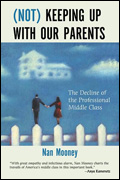All Faculty Excerpts
(Not) Keeping Up with Our Parents
 Gotham teacher Nan Mooney's nonfiction book (Not) Keeping Up With Our Parents: The Decline of the Professional Middle Class has recently been released by Beacon Press.
Gotham teacher Nan Mooney's nonfiction book (Not) Keeping Up With Our Parents: The Decline of the Professional Middle Class has recently been released by Beacon Press. This election year, there has been much vague discussion about the plight of the middle class, but this book cuts to heart of the matter. Mooney isn’t an economist; rather she combines her skills at journalism and storytelling and crafts over a hundred interviews into a startling and compelling true story, a story that may be similar to your own.
Here is how it starts: ____________________________________________________
These days, when my college-educated, gainfully employed thirty-something friends and I get together, we talk about money. Not how much we paid for that new Jetta or Prius, not the house we’re thinking of buying or where we’re going to spend our end-of-the-year bonuses. We talk about our inadequate health care insurance and whether we can afford it, about how to juggle credit card payments and crushing student loans, how to both work and pay for child care or whether we feel we can afford to have children at all. I’ll be honest: this wasn’t the life I’d expected. I grew up as the only child in a dual-income, middle class household in the 1970s. My father was a sales representative for a textbook publishing company and my mother was a third grade teacher. Even at the height of their careers, even with investments taken into account, their combined income never crossed over into the six figures. Yet we lived in a comfortable four-bedroom house in a comfortable residential neighborhood in Seattle. I attended private schools from kindergarten on and most years we took at least one family vacation.
We weren’t rolling in it but we weren’t scrambling either. Most of the families I knew were the same. They ranged from middle to upper class, though as a child I had only the vaguest sense which was which. There seemed little outward difference between those families headed by doctors or architects, stockbrokers or college professors. Everyone owned a house and a car. Some of my peers went to private colleges, others went to the University of Washington, some vacationed in Hawaii, others on the Oregon Coast.
My parents worked hard and spent sensibly, fleshing out their incomes with conservative investments in the stock market and conscientiously saving for retirement. Both received generous health benefits through their employers. They carried mortgage debt but nothing else, and paid my college tuition in full with the help of a small scholarship. Beyond stressing that I should get the best possible education, they encouraged me to choose a career that I loved above one that would be financially lucrative. I always assumed that, if I followed their model, I wouldn’t have to worry about money. That my life would unfold along the same “not wealthy but comfortable” lines as my parents’ had.
But the sort of family I grew up in seems near extinction these days, a middle class family who can support themselves on a pair of middle class jobs. Not only do many of today’s educated middle class professionals worry that they won’t exceed their parents when it comes to financial success, they fear they can’t even keep up with the middle class, and often the working class, lifestyles their parents modeled for them just decades ago. These days, the middle class faces a new and newly challenging set of financial choices, choices that inform not just our current economic lives but also the kind of value systems we will embody and pass down to our own children. The old standards still apply — buy a house and two cars and take your kids to Disneyland — but now there are new rules our generation hadn’t anticipated. You also have to pay your own health insurance, save for your own retirement, navigate spiraling housing costs and worry about losing your job to outsourcing or downsizing. It can quickly become too much for anyone — individual or family — to withstand on their own.
As members of the educated professional middle class, we’ve always fallen into categories like “full of potential” and “capable of changing the world,” not broke or strapped or scared out of our minds. But somehow in the course of doing everything right—and by that I mean embodying the American dream, from having the privilege of going to college to getting what would widely be considered a good job—something seems to have gone awry.
___________________________________________________________
Reprinted by permission of Beacon Press. To learn more about Nan and her book, visit: www.nanmooney.com.
